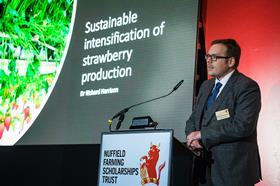
British soft fruit production may become uneconomical in the long-term if growers do not cut fossil fuel use according to a newly published Nuffield Farming Report.
In the paper titledWhere Next for soft fruit in the UK? Dr Richard Harrison, says new production methods must “design to avoid” fossil fuel use altogether in order to sustain the flourishing British crop.
The paper, sposored jointly by The Worshipful Company of Fruiterers and The Worshipful Company of Gardeners, provides a clear message to Britain’s successful berry industry on the steps needed to sustain domestic production into the future.
“Current systems founded on what makes ‘economic sense’ do not fully integrate the true externality of costs. If this problem remains unaddressed, it is possible that in the short-term, horticultural-associated emissions will rise not fall, and in the long-term, total energy demand and cost (at least in the UK) may render intensive horticulture uneconomical,” Harrison warned.
“This would be disastrous for both food security and for access to affordable nutritious food. As a consequence, improved tools and analyses, such as dynamic life cycle assessment (LCA), coupled to novel modelling and digital twinning approaches, are urgently needed to quantify externalities of production and provide evidence for where research efforts and potential interventions to enable low carbon, low energy alternatives should be directed.”
Harrison also suggests there ought to be greater policy incentivisation “to lower fossil fuel energy and transfer to renewable usage through a “produce or reduce” energy incentivisation scheme for green energy”.
In a wide-ranging paper, Harrison also says gene-editing should not be ruled out, saying there was “no case for regulation at all” for techniques such as CRISPR, which could also help reduce carbon emissions.
“Regulation, where it should exist at all, should be focussed on products, not technologies. Where, in approaches like gene editing, genetic mutations induced by targeted gene editing cannot be differentiated from spontaneously occurring mutations, there appears to be no case for regulation at all.
“Although not a magic solution, gene editing is an important part of the toolkit and one that, if rapid progress is desired, should not be off the table.”
Technology could also provide consumers with greater understanding of the impact of their purchasing decisions, while nudge incentives for food miles, as with the plastic bag tax, can help diminish carbon-emitting food miles.
“The 5p carrier bag tax is a classic example of a nudge policy that has reduced usage dramatically. Could it be possible, through a small ‘nudge’ tax on food miles, clearly signposted on food change shopping choices?”
Dr Harrison's full Nuffield Scholarship paperWhere Next for soft fruits in the UK? can be downloaded here.
A presention on the report from Dr Harrison can be viewed here.



